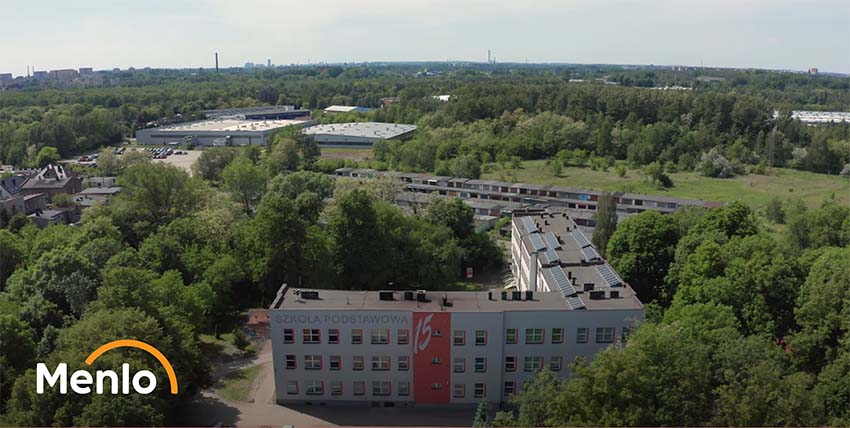Menlo Electric is the fastest-growing PV distributor in EMEA (Europe, Middle East, Africa) with a mission to support energy transition in this region. The company operates in more than 25 markets selling modules, inverters and batteries from the leading brands in the renewable energy industry.

Established in 2020, Menlo crossed EUR 50M in revenue in 2021 and EUR 150M in 2022. They fulfill over 1,000 orders serving 300+ clients monthly and the seven logistics centers located in strategic hubs enable quick delivery for our clients across the EMEA region. The international team of experts consists of employees from 20 countries speaking 15+ languages.
But Menlo is not only about business. In 2022, they launched a charity project – “Energy to power your future”, in which they install photovoltaic installations for free at institutions that take care of children. The first charity installation was made in Poland, now Menlo is focusing on the international development of this project.
Interview with Bartosz Majewski, CEO of Menlo Electric.
Easy Engineering: What are the ranges of products?
Bartosz Majewski: We offer PV modules, inverters and batteries. Menlo is already a top 3 EU distributor of global module manufacturing leaders, Jinko Solar and Risen Energy. We are also a leading European distributor of JA Solar modules and inverters from Sungrow, SolarEdge and FoxESS. At the beginning of 2023, we are expanding our product portfolio even more.
E.E: Who is your offer addressed to?
B.M: Our clients represent all market segments: from residential and C&I (commercial and industrial) installers to utility scale developers and EPCs. We serve clients of all sizes, including market leaders. For example, we have supplied 4 of the top 5 biggest residential installers in the EMEA region with Risen full black modules this year. We also established cooperation with Ignitis, Lithuania’s biggest utility and developer which we supplied with Jinko Solar bifacial modules.
E.E: At what stage is the PV market now?
B.M: Last year European Union added 26 GW of solar power and expects to add more than 50 GW each year until 2030. The growth can be seen across all segments – residential, business and utility as well. However, there are some challenges along the way – last year it was delays in module shipments, this year we have faced shortages of inverters and batteries. The lack of inverters in the global PV market caused limitations in large industrial and farm installations (50 kW+). The situation with inverters in the 10-50 kW segment, for small and medium-sized enterprises, is better, though still not quite satisfactory.
In 2022 module prices continued to increase, peaking around September and October. However, it seems that the price increases are now behind us. Although module production costs remain high, the drop in freight prices gives us a reason to expect module price reductions in the first quarter of next year.
At Menlo, our mission is to provide our clients with uninterrupted supplies of top-quality equipment at attractive prices despite those challenges.
E.E: What can you tell us about market trends?
B.M: In module manufacturing, we are undergoing a switch for more efficient and higher power panels, from the so-called P-types to N-types. This will be a major technological shift, as was the change from polycrystalline to monocrystalline modules as few years ago. The demand for N-type modules is outpacing the supply, meaning that there will not be enough N-type modules next year.
Regarding inverters, string inverters will be gradually replaced by hybrid inverters with battery sets. Right now, in Germany and Italy, over 90% of new installations have batteries attached. In Central Europe, e.g. Poland and Romania, the attachment rate is less than 5%.
E.E: What are the most innovative products marketed?
B.M: We see an increasing popularity of N-type modules in almost all markets we operate in. They have a higher bifacial factor which brings higher energy generation compared with P-type module. After 30 years, N-type has a guaranteed efficiency of 87,4 %, 2.6 percentage points more than P-type. N-type delivers a higher power on a sunny day under the same external environment and the heat loss is greatly reduced as well.

E.E: What piece of advice would you give businesses and installers?
B.M: Briefly speaking – stock up in advance.
Considering the current and projected prices of electricity, the cost of a possible delay in completing a photovoltaic installation is very high. This mainly results from a loss of revenue or savings caused by deferring the start of production.
According to Rystad Energy simulations, with the current electricity prices in countries such as Germany, the UK, France, and Italy, the payback period for a PV installation can be less than a year. That means that a delay in its construction by two months translates to a real loss of revenue of about 15-20% of the value of the investment. Postponing purchases in hopes of potential savings of, say, 3% on component costs makes for a poor deal in comparison.

